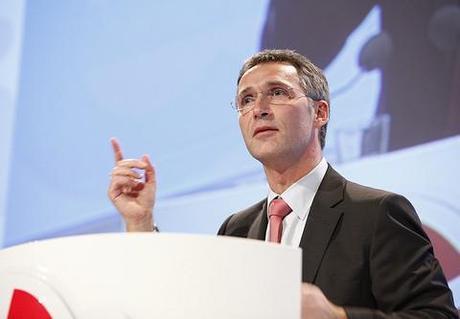
Norwegian Prime Minister Jens Stoltenberg. Photocredit: Socialdemokrater http://www.flickr.com/photos/flickr-s/4053379256/sizes/m/in/photostream/
Anti-immigration extremist Anders Behring Breivik’s attacks on government buildings in Oslo and on a youth camp on the island of Utoya have rocked Norway. But the Norwegian Prime Minister, Jens Stoltenberg, has responded with a “quiet call of defiance” to make his country “even more open and accepting.” The country is grieving as the names of the 76 dead are slowly released by the police, whilst an independent commission will be set up in order to investigate the attacks, in particular the slow response of the police.
- Freedom of thought, not violence. In contrast to the American response after the 9/11 terrorist attacks on New York, which called for greater security measures, said Jim Heintz and Karl Ritter on AP, Stoltenberg called for “more openness and greater political participation.” He also defended the right to hold extreme views – even those held by Anders Behring Breivik. “ ‘What is not legitimate is to try to implement those extreme views by using violence,’” said the Prime Minister.
- Consoling measures. The independent commission, reported The Belfast Telegraph, will investigate what happened in order to inform relatives; the Norwegian Parliament has also voted to put money towards funerals, whilst a national monument to the dead will be set up.
“I have cried, and I have told many people that they should not hesitate to cry.” Jens Stoltenberg, Norwegian Prime Minister.
- Stoltenberg is a hero in the making. “Openness is not a confession of weakness, any more than tears are a reason for shame,” said Oakland Ross on The Toronto Star. This was Stoltenberg’s “finest hour”, as, intead of blaming or hating, “he took a mortal wound and turned it into a kind of balm — the hope of a better world.” The tranquility of Norway will not depart, and 94 percent of the Norwegian public are behind him. Let’s hope for the survival of tolerance – and the people on the streets bearing flowers and candles are a testament to that.
- Things looking brighter. Erik L’Estrange, a 20-year old who escaped the killings on the island, told Mary Fitzgerald on The Irish Times that he has been comforted by the Norwegian response: “‘The way Norwegian society has come together, the way everyone has offered support, gives me hope that this is something that will make us stronger. Things are starting to look a little brighter. I believe my friends died doing what they believed in, and I think in the long term this can change Norway in a very good way.’”
- Slow police response. The slow pace of the police response has been criticised, commented Michael Schwirtz on The Boston Globe. SWAT commandos took 90 minutes to reach Utoya, whilst helicopters were unavailable – delays that could have cost lives. 10 commandos used two civilian boats to reach the island, with one encountering engine trouble, but, the police say, “this did not cause significant delays.” And when they arrived, “Breivik seemed satisfied with the extent of his killing. They found him standing with his hands behind his head, his weapons thrown to the ground.” Breivik’s continuing ability to remain “under the radar” has also come under scrutiny.
- Unusual requests. Meanwhile, said Sky News, Breivik has been making “several unusual demands while in solitary confinement. He has asked for special food, access to his manifesto and also permission to view the website Wikileaks.”
- Haven for youth? Utoya, reported Roddy Thomson on News.com.au, may become a haven for youth. Billionaire Petter Stordalen said he wants the island ”associated with joy, unity and optimism.” Stordalen said he had already raised eight million krone for his “international-grade oasis for a new political ‘enlightenment’”. He continued, “[t]his is about the future of democracy, and without young European engagement in politics, there is no democracy.”
More on the Norwegian terrorist attacks
- Did Breivik have links to the EDL?
- What drove Breivik to kill?
- How many more Breiviks are out there?
- What do these terror attacks mean for Europe?
- Bombings, shootings terrify Norway

